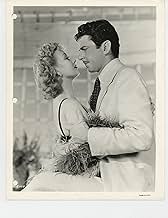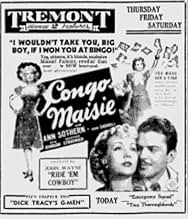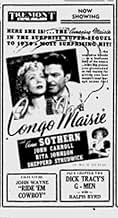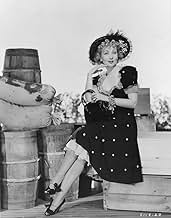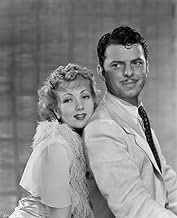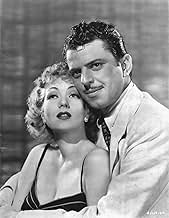अपनी भाषा में प्लॉट जोड़ेंBrooklyn showgirl Maisie gets stranded in the African jungle with a romantic doctor.Brooklyn showgirl Maisie gets stranded in the African jungle with a romantic doctor.Brooklyn showgirl Maisie gets stranded in the African jungle with a romantic doctor.
- पुरस्कार
- कुल 2 जीत
William Broadus
- Third Witch Doctor
- (बिना क्रेडिट के)
Tom Farrell
- Sergeant
- (बिना क्रेडिट के)
Joel Fluellen
- Native
- (बिना क्रेडिट के)
Buddy Harris
- Second Witch Doctor
- (बिना क्रेडिट के)
Darby Jones
- First Witch Doctor
- (बिना क्रेडिट के)
फ़ीचर्ड समीक्षाएं
This time, just call Maisie "Congo Maisie" in this 1940 second entry into the "Maisie" series. Each episode of Maisie's fabulous life is done as a separate entity as if the previous one never happened. So don't get too attached to anyone.
Maisie, stranded as usual, stows away on a ship that doesn't go the way she wants and, in fact, breaks down. She tags along with a rubber plantation manager (John Carroll) when he hikes to his old house where he worked as a doctor (he's since forsaken the Hippocratic oath). Now it's the home of a doctor who does research (Sheppard Strudwick) and his wife (Rita Johnson).
"Congo Maisie" is chock full of adventure, with Maisie assisting in an emergency operation and, wearing a gown and a Carmen Miranda headpiece from her club act, fends off witch doctors.
It's quite funny but as my sister yelled out to me hearing some of it, "Is that a politically incorrect movie you're watching in there?" Uh, yeah.
John Carroll is the new object of Maisie's affections. He talks a lot and uses a monotone that becomes grating real fast. I recall a photo of him where he was presented as a Gable wannabe. Forget it. Rita Johnson is absolutely lovely, and Sheppard Strudwick is very good. Fun.
Maisie, stranded as usual, stows away on a ship that doesn't go the way she wants and, in fact, breaks down. She tags along with a rubber plantation manager (John Carroll) when he hikes to his old house where he worked as a doctor (he's since forsaken the Hippocratic oath). Now it's the home of a doctor who does research (Sheppard Strudwick) and his wife (Rita Johnson).
"Congo Maisie" is chock full of adventure, with Maisie assisting in an emergency operation and, wearing a gown and a Carmen Miranda headpiece from her club act, fends off witch doctors.
It's quite funny but as my sister yelled out to me hearing some of it, "Is that a politically incorrect movie you're watching in there?" Uh, yeah.
John Carroll is the new object of Maisie's affections. He talks a lot and uses a monotone that becomes grating real fast. I recall a photo of him where he was presented as a Gable wannabe. Forget it. Rita Johnson is absolutely lovely, and Sheppard Strudwick is very good. Fun.
Ann Sothern does what she can with the material in this far-fetched story set in the jungles of West Africa, but the film never really makes an impact. Although the acting is fine throughout, the fast-talking Sothern is the only character I really liked. And the only sequence I truly enjoyed was the one-minute crash course Sothern gets from John Carroll on how to assist in an appendectomy. I think even I could do it now.
The film has been called a "loose" remake of Red Dust (1932), but it is actually based on a different book, "Congo Landing," which was written by the same author after Red Dust was released. It is similar in plot to it as well as to Torrid Zone (1940).
The film has been called a "loose" remake of Red Dust (1932), but it is actually based on a different book, "Congo Landing," which was written by the same author after Red Dust was released. It is similar in plot to it as well as to Torrid Zone (1940).
"Congo Maisie" is the second film of what would be a 10-fim series of comedies mixed with other genres by MGM from 1939 to 1947. The first film , "Maisie" of 1939, had been planned for Jean Harlow in 1937 until she died suddenly of liver disease. Ann Sothern was picked for her role two years later and did so well that MGM had its writers churn out nine more tales based on the Maisie Ravier character.
In these early films, Maisie is usually playing a club dancer and singer who's between jobs or enroute to another one. But here she happens to be in British West Africa, just before World War II. The opening scene identifies it as Kurmala, West Africa, and it appears to be on the coast at the mouth of the Congo River. That might be present day Muanda of the Democratic Republic of the Congo.
The movie opens with Maisie sneaking out of her hotel to avoid the proprietor because she can't pay her bill. She stows away on a boat that she thinks will be traveling along the coast. So, she's surprised when she finds out its going a good distance up the Congo. And that's where this comedy drama takes place. The boat engine conks out and Maisie and the male passenger, Dr. Michael Shane, have to walk a couple miles to the Atkinson Rubber Co. Medical station, where he used to work.
This story centers around the former doctor who's now trying to make it big running a plantation. But when the new doctors takes ill, he has to again practice medicine. Besides helping the doctor with his practice, Maisie helps stem a medicine-man provoked uprising with some magic of her own. And, she helps save the stations doctor's marriage. Naturally, the comedy is quite low-key in such a setting, but it's a good and entertaining film.
Here are some favorite lines.
Nelson, "Have you seen anything of a blonde?" Captain Finch, "Brother, where is she?" Nelson, "That's what I'm asking you. Are you sure that there ain't been no blonde with a suitcase stowed away on this boat within the last couple of hours?" Captain Finch: "Listen, silly, if there was a blonde on board, would I be out here talkin' to you? You've got it easy. You're behind that face. Brother, from the front it's terrible."
Captain Finch, "And don't ever offer anybody money like that - in the presence of witnesses."
Maisie Ravier, "Hey, what happens to me? Can I come along?" Dr. Michael Shane, "Suit yourself." Maisie, "Well, it's you or the crocodiles, and they got more teeth."
Maisie Ravier, "What was that?" Dr. Michael Shane, "A baboon drumming." Maisie, "Now, who'd give a baboon a drum, missionaries?"
Maisie Ravier, "Hmh. All the modern conveniences. Electric lights, hot and cold running monkeys...."
Maisie Ravier, "Hey, wait a minute. This is not how you look at a place. I've even had fun in Philadelphia - in good company."
Dr. Michael Shane, "I spent five years serving humanity. Now I'm looking out for Michael Shane." Dr. John McWade, "I didn't know you could measure service to humanity five years and then no more."
Dr. Michael Shane, "Little girls who listen at key holes don't go to heaven." Maisie, "I know, but sometimes you get a chance to help someone you like and I like that Mrs. McWade."
Maisie Ravier, "You better operate." Dr. Michael Shane, "I'm not practicing medicine." Maisie, "Have you stopped practicing being a man?"
Dr. Michael Shane, "I'm going to take that out, McWade. I know you don't like me, but my worst enemy will tell you that I'm handy with a knife."
In these early films, Maisie is usually playing a club dancer and singer who's between jobs or enroute to another one. But here she happens to be in British West Africa, just before World War II. The opening scene identifies it as Kurmala, West Africa, and it appears to be on the coast at the mouth of the Congo River. That might be present day Muanda of the Democratic Republic of the Congo.
The movie opens with Maisie sneaking out of her hotel to avoid the proprietor because she can't pay her bill. She stows away on a boat that she thinks will be traveling along the coast. So, she's surprised when she finds out its going a good distance up the Congo. And that's where this comedy drama takes place. The boat engine conks out and Maisie and the male passenger, Dr. Michael Shane, have to walk a couple miles to the Atkinson Rubber Co. Medical station, where he used to work.
This story centers around the former doctor who's now trying to make it big running a plantation. But when the new doctors takes ill, he has to again practice medicine. Besides helping the doctor with his practice, Maisie helps stem a medicine-man provoked uprising with some magic of her own. And, she helps save the stations doctor's marriage. Naturally, the comedy is quite low-key in such a setting, but it's a good and entertaining film.
Here are some favorite lines.
Nelson, "Have you seen anything of a blonde?" Captain Finch, "Brother, where is she?" Nelson, "That's what I'm asking you. Are you sure that there ain't been no blonde with a suitcase stowed away on this boat within the last couple of hours?" Captain Finch: "Listen, silly, if there was a blonde on board, would I be out here talkin' to you? You've got it easy. You're behind that face. Brother, from the front it's terrible."
Captain Finch, "And don't ever offer anybody money like that - in the presence of witnesses."
Maisie Ravier, "Hey, what happens to me? Can I come along?" Dr. Michael Shane, "Suit yourself." Maisie, "Well, it's you or the crocodiles, and they got more teeth."
Maisie Ravier, "What was that?" Dr. Michael Shane, "A baboon drumming." Maisie, "Now, who'd give a baboon a drum, missionaries?"
Maisie Ravier, "Hmh. All the modern conveniences. Electric lights, hot and cold running monkeys...."
Maisie Ravier, "Hey, wait a minute. This is not how you look at a place. I've even had fun in Philadelphia - in good company."
Dr. Michael Shane, "I spent five years serving humanity. Now I'm looking out for Michael Shane." Dr. John McWade, "I didn't know you could measure service to humanity five years and then no more."
Dr. Michael Shane, "Little girls who listen at key holes don't go to heaven." Maisie, "I know, but sometimes you get a chance to help someone you like and I like that Mrs. McWade."
Maisie Ravier, "You better operate." Dr. Michael Shane, "I'm not practicing medicine." Maisie, "Have you stopped practicing being a man?"
Dr. Michael Shane, "I'm going to take that out, McWade. I know you don't like me, but my worst enemy will tell you that I'm handy with a knife."
If you are a fan of the Maisie films you may be surprised (as I was) that this is only the second in the series (out of ten). It's so over the top it feels like the series has "jumped the shark" and the brassy showgirl from Brooklyn finds herself in Africa in an isolated medical camp surrounded by restless natives.
In all her films Maisie gets into hilarious situations, but the best scenes are when her suffering stage acts go horribly wrong just before she gets fired.... In Congo Maisie however the "disaster" stage act comes at the climax when she must out voodoo a native witch doctor with hokey illusions from her nightclub act - and of course this means she has to present her entire show including singing St Louis Woman to the accompaniment of native drums while wearing a showgirl costume. This is mere minutes after assisting in emergency surgery, meanwhile clearing up the relationships of everyone around her.... It's all for laughs at a manic screwball pace. Southern moves briskly from scene to scene holding the energy. By the time she starts doing her nightclub act in the jungle I was in love.
All the Maisie movies are charmers, and as the series progressed Maisie joins the war, works in an airplane factory, goes out west and discovers a hidden goldmine.... Maisie is practically a prototype of Scooby-Doo-esque iconic American adventures, borrowing liberally from trendy plot lines appropriate for a B comedy. They are all feather light and Ann Southern puts so much heart and sweetness into her character, It's wonderful to see same Maisie story progression, her fighting and falling in love with her leading man again and again - even though we know it won't be the same guy next time, poor Maisie!
But Congo Maisie is the one that really stands out as the most outrageous and off the hook. It breaks from the apple pie formula into stylized farce, and pokes fun at so many movie tropes of the day that it stands out from the rest of the series as a funny parody of many films, from Harlow's Red Dust to Ann Harding's Prestige, all painted with broad strokes and with snappy dialog.
In all her films Maisie gets into hilarious situations, but the best scenes are when her suffering stage acts go horribly wrong just before she gets fired.... In Congo Maisie however the "disaster" stage act comes at the climax when she must out voodoo a native witch doctor with hokey illusions from her nightclub act - and of course this means she has to present her entire show including singing St Louis Woman to the accompaniment of native drums while wearing a showgirl costume. This is mere minutes after assisting in emergency surgery, meanwhile clearing up the relationships of everyone around her.... It's all for laughs at a manic screwball pace. Southern moves briskly from scene to scene holding the energy. By the time she starts doing her nightclub act in the jungle I was in love.
All the Maisie movies are charmers, and as the series progressed Maisie joins the war, works in an airplane factory, goes out west and discovers a hidden goldmine.... Maisie is practically a prototype of Scooby-Doo-esque iconic American adventures, borrowing liberally from trendy plot lines appropriate for a B comedy. They are all feather light and Ann Southern puts so much heart and sweetness into her character, It's wonderful to see same Maisie story progression, her fighting and falling in love with her leading man again and again - even though we know it won't be the same guy next time, poor Maisie!
But Congo Maisie is the one that really stands out as the most outrageous and off the hook. It breaks from the apple pie formula into stylized farce, and pokes fun at so many movie tropes of the day that it stands out from the rest of the series as a funny parody of many films, from Harlow's Red Dust to Ann Harding's Prestige, all painted with broad strokes and with snappy dialog.
Maisie is Maisie. Always enjoyable, but never rising to the level of series like The Thin Man. I like them as much as Blondie and a little better than Torchy. If you liked the first one you can certainly bask in this mix of seriousness and silliness.
Typically, some people are upset that the African characters are not all depicted as surgeons or poets. Oddly, these guardians of the film world end up minimizing the contributions of the black actors and the importance of the African characters (e.g., Everett Brown as Jallah).
Third World riots aren't pretty (they share this quality with First World riots). Hollywood would film it different today, but they'd also ruin the movie with politics. To enjoy old movies we have to accept that things were different then.
My rating (7/10) is measuring Congo Maisie against other movies in the series and against other series movies of the same type.
Typically, some people are upset that the African characters are not all depicted as surgeons or poets. Oddly, these guardians of the film world end up minimizing the contributions of the black actors and the importance of the African characters (e.g., Everett Brown as Jallah).
Third World riots aren't pretty (they share this quality with First World riots). Hollywood would film it different today, but they'd also ruin the movie with politics. To enjoy old movies we have to accept that things were different then.
My rating (7/10) is measuring Congo Maisie against other movies in the series and against other series movies of the same type.
क्या आपको पता है
- ट्रिवियाThis film is based on the 1934 novel "Congo Landing" by Wilson Collison and is not a remake of Red Dust (1932). Although the two films are similar, and promotional material for Congo Maisie compared them, Red Dust was based on the 1928 play of the same name, also by Collison. The play was adapted in a second version as Mogambo (1953) with the setting changed from Indochina to Africa.
- गूफ़When Dr. Shane is trying to hold off the natives at the end, Maisie comes out and does some magic tricks - a color-changing scarf, and cards appearing from nowhere. Dr. Shane tells her to do more, and she says that's all she has. Yet earlier, she was doing a trick with a disappearing ball. And later she comes out doing a water trick.
- भाव
Dr. Michael Shane: Little girls that listen at keyholes don't go to heaven.
- कनेक्शनFollowed by Gold Rush Maisie (1940)
टॉप पसंद
रेटिंग देने के लिए साइन-इन करें और वैयक्तिकृत सुझावों के लिए वॉचलिस्ट करें
विवरण
- रिलीज़ की तारीख़
- कंट्री ऑफ़ ओरिजिन
- भाषा
- इस रूप में भी जाना जाता है
- Boginja Konga
- फ़िल्माने की जगहें
- उत्पादन कंपनी
- IMDbPro पर और कंपनी क्रेडिट देखें
- चलने की अवधि1 घंटा 11 मिनट
- रंग
- पक्ष अनुपात
- 1.37 : 1
इस पेज में योगदान दें
किसी बदलाव का सुझाव दें या अनुपलब्ध कॉन्टेंट जोड़ें



